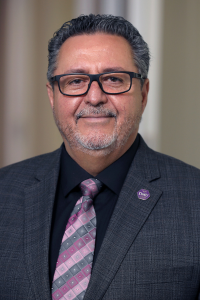The Importance of Observing: Celebrating National Hispanic Heritage Month at Osteopathic Schools
Published September 20, 2023
Inside OME

Rich A. Salas, PhD
Chief Diversity Officer/Assistant Professor, Des Moines University
Celebrating National Hispanic Heritage Month (NHHM) as well as other National Heritage Months is of paramount importance for colleges of osteopathic medicine. The NHHM observance recognizes the significant contributions and diverse perspectives of the Hispanic/Latinx community in the healthcare field and beyond. By acknowledging and celebrating the achievements of Hispanic/Latinx individuals, osteopathic colleges foster a more inclusive and culturally sensitive learning environment.
Diversity in the healthcare workforce is crucial for providing equitable care to all patients. People of Hispanic/Latinx heritage constitute a substantial portion of the U.S. population (19 percent), and their unique cultural experiences can impact their health needs and preferences. By celebrating National Hispanic Heritage Month, colleges of osteopathic medicine send a clear message that they value the insights and knowledge that Hispanic/Latinx students, faculty and healthcare professionals bring to the table. This inclusivity leads to more effective patient care that respects and addresses the cultural dimensions of health.
Furthermore, the celebration of Hispanic/Latinx heritage serves as a source of inspiration for aspiring healthcare professionals from the Hispanic/Latinx community. Visibility matters, and highlighting the achievements of Hispanic/Latinx doctors, researchers and practitioners can motivate young individuals to pursue careers in healthcare. Representation also helps combat the underrepresentation of minorities in medicine, a disparity that can only be rectified through intentional efforts to highlight diverse role models.
Hispanic Heritage Month provides a platform for colleges of osteopathic medicine to engage in educational initiatives that promote cultural competency/humility and helps them to begin to understand structural competency. Students, faculty and staff can participate in workshops, discussions and events that focus on understanding the cultural nuances that impact healthcare decision-making. By equipping future healthcare professionals with these skills, colleges ensure that patients from Hispanic/Latinx backgrounds receive culturally responsive care that aligns with their values and beliefs, leading to better patient outcomes.
Celebrating diversity in all its forms, including race, ethnicity, heritage and intersectionality, is a cornerstone of a well-rounded education. Colleges of osteopathic medicine are not just institutions for learning medical facts or medical procedures; they also play a pivotal role in shaping compassionate and culturally aware individuals. Through the celebration of National Hispanic Heritage Month, these colleges demonstrate their commitment to nurturing well-rounded professionals who can connect with patients on a deeper level, fostering trust and improving patient-clinician communication.
Moreover, celebrating National Hispanic Heritage Month is not just an internal affair—it is an opportunity for colleges to connect with the communities they serve. By organizing outreach programs, health fairs and informational sessions in collaboration with Hispanic/Latinx community organizations, colleges can bridge the gap between healthcare institutions and underserved populations. This outreach not only promotes health education, but it also establishes a sense of trust and partnership that can lead to long-lasting improvements in community health.
At Des Moines University, celebrating National Hispanic Heritage Month within colleges of osteopathic medicine and beyond is essential for a multitude of reasons. It promotes diversity, inclusion and cultural sensitivity within the healthcare field. It encourages representation and inspires future healthcare professionals from the Hispanic/Latinx community. It fosters cultural competency and improved patient care, and it strengthens ties between healthcare institutions and underserved populations for all our students, faculty and staff. By recognizing and celebrating the achievements of the Hispanic/Latinx community, colleges of osteopathic medicine contribute to a more equitable, compassionate and effective healthcare system for all.
Rich A. Salas, PhD, joined Des Moines University (DMU) when the university established an Office of Multicultural Affairs in 2012. A member of the National Association of Diversity Officers in Higher Education Board of Directors, he has worked with DMU faculty to incorporate cultural literacy content into curricula, and he greatly expanded programming to enhance cultural competency of all students. He also established a Multicultural Affairs Student Advisory Council and facilitated creation of a Faculty and Staff Diversity Council at DMU.
